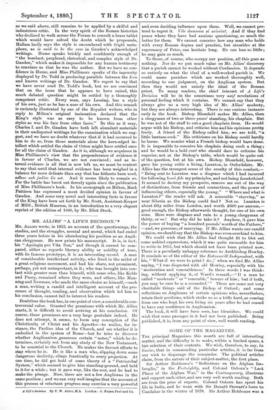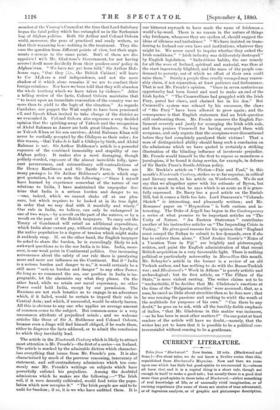SOME OF THE MAGAZINES.
TUE principal Magazines this month are full of interesting matter, and the difficulty is to make, within a limited space, a fair selection of their contents. We wish, therefore, to say, in limine, that in commending particular articles, it is far from our wish to disparage the remainder. The political articles claim, from the nature of their subject-matter, the first place.
Sir Arthur Hobhouse's " Reflections on the Afghan Im- broglio," in the Fortnightly, and Colonel Osborn's " Last Phase of the Afghan War," in the Contemporary, illustrate and support each other, and are very well worth reading. Both are from the pens of experts. Colonel Osborn has spent his life in India, and he went with Sir Donald Stewart's force to Candahar in the winter of 1878. Sir Arthur Hobhouse was a member of the Viceroy's Council at the time that Lord Salisbury began the fatal policy which has entangled us in the Serbonian bog of Afghan politics. Both Sir Arthur and Colonel Osborn wield, moreover, the pens of practised and ready writers, so that their reasoning loses nothing in the treatment. They dis- cuss the question from different points of view, but their argu- ments c niverge to the same point. Both of them are dis- appointel with Mr. Gladstone's Government, for not having severe I itself more decidedly from their predecessors' policy in Afghanistan. " We have not yet been told," Sir Arthur Hob- house says, "that they [i.e., the British Cabinet] will leave to the Afghans a real independence, and not the mere shadow of it which alone remains if we are to conduct their foreign relations. Nor have we been told that they will abandon the whole territory which we have taken by violence." After a telling review of the facts, Colonel Osborn maintains that 4‘ tO insist upon an immediate evacuation of the country was no more than to yield to the logic of the situation." As regards Candahar, our puppet the Wali ought to have been pensioned ca and Eyoub Khan invited to take charge of the district as we evacuated it. Colonel Osborn also expresses a very decided opinion that the spiriting-away of Yakoob and the recognition of Abdul Rahman as Ameer are both great blunders. So long as Yakoob Khan or his son survives, Abdul Rahman Khan will never be cordially accepted by the Ghilzyes as their ruler ; for this reason,—that Yakoob is half a Gbilzye by birth, and Abdul Rahman is not. Sir Arthur Hobhouse's article is a powerful exposure of the combined immorality and stupidity of our Afghan policy. It makes also a most damaging, though politely-worded, exposure of the almost incredible folly, igno- rant perverseness, and extraordinary self-contradictions of Sir Henry Rawlinson and Sir Bartle Frere. There are many passages in Sir Arthur Hobhouse's article which sug- gest quotation, bat we note the following :—" Since I myself have learned by experience somewhat of the nature of our relations to India, I have maintained the unpopular doc- trine that India is a serious burden and danger to us, —one, indeed, which we cannot shake off at our plea- sure, but which requires to be looked at in its true light, in order that we may deal with it manfully and wisely." Our rule in India, we believe, can only be endangered in one of two ways,—by a revolt on the part of the natives, or by a revolt on the part of the British taxpayers. To carry out the Treaty of Gaudamak will entail an additional expenditure, -which India alone cannot pay, without straining the loyalty of the native population to a degree of tension which might make it suddenly snap. If, on the other hand, the English taxpayer be asked to share the burden, he is exceedingly likely to ask awkward questions as to the use India is to him. India, more- over, is our weak point in Continental politics. Our increasing nervousness about the safety of our rule there is paralysing more and more our influence on the Continent. But if " India is a serious burden and danger to us," it would certainly be a still more " sericus burden and danger" to any other Power. So long as we command the sea, our position in India is im- pregnable, let the alarmists say what they please. Ou the other hand, while we retain our naval supremacy, no other Power could hold India, except by our permission. The Russians are not such lunatics as to engage in an adventure which, if it failed, would be certain to imperil their rule in Central Asia ; and which, if successful, would be utterly barren. All this is obvious to any one who applies an average amount of common-sense to the subject. But common-sense is a very uncommon attribute of prejudiced minds ; and we welcome articles like those of Sir A. Hobhouse and Colonel Osborn, because even a Jingo will find himself obliged, if he reads thorn, either to disprove the facts adduced, or to admit the conclusion to which they inevitably lead.
The article in the Nineteenth Century which is likely to attract most attention is Mr. Froude's—the first of a series—on Ireland. The article is marked by the admirable diction which character- ises everything that issues from Mr. Fronde's pen. It is also nharacterised by much of the perverse reasoning, inaccuracy of statement, and self-contradictory admissions which too com- monly mar Mr. Froude's writings on subjects which have powerfully enlisted his prejudices. Among the doubtful admissions which he makes are the following :—" The Irish soil, if it were decently cultivated, would feed twice the popu- lation which now occupies it." " The Irish people are said to be unfit for fveedom; if so, it is we who have unfitted them. It is our bitterest reproach to have made the name of Irishman a world's by-word. There is no reason in the nature of things why Irishmen, whenever they are spoken of, should suggest the ideas of idleness and turbulence." " We have insisted on trans- ferring to Ireland our own laws and institutions, whatever they might be. We never cared to inquire whether they suited the Irish conditions." " Irish industry was deliberately destroyed " by English legislation. " Industrious habits, the one remedy for all the woes of Ireland, spiritual and material, was thus at the start ingeniously blighted, and the mass of the people con- demned to poverty, out of which no effort of their own could raise them." Surely a people thus cruelly wronged may reason- ably claim, if not reparation, at least patience and forbearance. That is not Mr. Froude's opinion. " Once in seven centuries an opportunity had been found and used to make an end of the Irish hydra." "The Cromwellians had grappled with the Irish Fury, pared her claws, and chained her in his den." But Cromwell's system was relaxed by his successor, the claws of " the Fury " have been allowed to grow again; and the consequence is that English statesmen find an Irish question still confronting them. Mr. Fronde censures the English Par- liament severely and justly for scourging the Irish with rods, and then praises Cromwell for having scourged them with scorpions, and only regrets that the scorpions were discontinued before they had completely paralysed their victims ! That a man of distinguished ability should hang such a conclusion on the admissions which we have quoted is certainly a striking illustration of the blinding influence of inveterate prejudice. Mr. Froude would himself be the first to expose so monstrous a liaralogism, if he found it doing service, for example, in defence of Sir Bartle Frere's South-African policy.
Mr. Rnskin's article on " Fiction—Fair and Foul," in this month's Nineteenth Century, strikes us as far superior, in critical and literary merit, to his article on Wordsworth. We do not say that we altogether agree with his estimate of Byron, but there is much in what he says which is as acute as it is grace- fully expressed. Dr. Barry has a good article on the Burials Bill, but it comes a little too late. Lord Dunraven's "Colorado Sketch " is interesting, and pleasantly written ; and Mr. Romans' paper on " Hypnotism " is both curious and in- teresting. The Duke of Argyll has begun in the Contemporary a series of what promise to be important articles on " The Unity of Nature. " An Eastern Statesman " contributes another of his instructive articles on "The Impending Crisis in Turkey." He gives good reasons for his opinion that " England must compel the Sultan to submit to her demands, even if she has to enforce them alone." Chief Justice Gorrie's "Notes of a Vacation Tour in Fiji " are brightly and picturesquely written, and paint the English administration of that recent British acquisition in a very favourable light. There is nothing political or particularly noteworthy in Macmillan this month. Mr. Schuyler's article in the former is a review of an old Turkish author, and has nothing to do with the Russo-Turkish war ; and BlacJavood's " Week in Athens "is purely artistic and archaeological ; but its first article, on " The Pillars of the State," is mere violent ranting. The writer claims not to be "uncharitable, if he decides that Mr. Gladstone's emotions at the time of the Bulgarian atrocities' were assumed; that, as a man, he cared as little about atrocities then as he does now ; that he was rousing the passions and seeking to wield the wrath of the multitude for purposes of his own." " Cau there be any doubt," he goes on to ask, with all the forcibly-feeble emphasis of italics, " that Mr. Gladstone in this matter was insincere, —as he has been in most other matters P" On one point at least readers of the article will have no doubt,—namely, that the writer has yet to learn that it is possible to be a political con- troversialist without ceasing to be a gentleman.



































 Previous page
Previous page